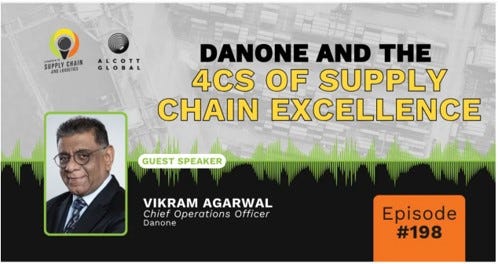Four Educational Supply Chain Podcasts
I’m a big fan of podcast interviews. You can get information that is otherwise hard to get. It also makes driving or working out a bit more educational.1
Here are four educational podcasts that I share (or will share) with my supply chain (and operations) classes:
A podcast from Danone’s COO gives a good overview of a global supply chain and what they focus on: Customer service, cost, cash, and carbon. In the interview, he gives context to the topics we discuss in class: Improving on-shelf availability to drive revenue, building capacity in remote markets to improve delivery times and increase revenue, inventory optimization to manage cast, and using logistics to reduce carbon emissions. He also touched on the need for supply chains to get better at dealing with new product introduction, which is a huge part, not an afterthought, in any supply chain.
A podcast on what it takes to be a Chief Supply Chain Officer (CSCO). I share this for good career advice for students entering or considering a supply chain career. My five takeaways from this podcast are:
Make sure you get end-to-end experience. As you build your career, see if you can get assignments in planning, procurement, manufacturing, and logistics.
Get international experience, especially in Asia, if you are US-based.
Don’t just focus on the supply chain; understand the business side (who the customers are and how the company makes money). This is good general advice, no matter your function.
You don’t need to be a technical expert. But, you have to understand and deploy technology and have good experts around you.
Universities only take you so far. This goes against what I do, but his point was valid: if you want to learn, there are plenty of resources out there.
A new podcast series, Supply Chain Optimizers2, just dropped. The first episode is an instant classic, with UPS’s Jack Levis talking about his experience implementing their huge routing system.
This episode helps you understand what it takes to implement a large optimization system. This includes creating a solid data foundation and treating that like a product. UPS famously created street maps because the commercial ones weren’t good enough. In addition, good implementation includes rolling out the project in phases and measuring local managers based on what they can control.
The host wrote up his findings on LinkedIn.
Finally, in another first episode, American Eagle and Quiet featured my former Opex Analytics colleague Gabriella Runnels. This short interview (~11 minutes) covers a lot of ground.
I like this because it shows many creative uses of machine learning and optimization for retailers. This includes forecasting fashion items using clustering, dynamic inventory routing (to minimize inventory, minimize transportation costs, and minimize packages while taking advantage of multiple warehouses), and determining the best way to liquidate unproductive inventory.
If you enjoy these types of podcasts, here is a list of other operations podcast episodes I put together.
People often complain that podcasts have low information per minute versus reading. I agree. I would rather read. However, the things some experts say never get written, I don’t like reading transcripts, and there are times when you can only listen (like driving or going for a walk).
Full disclosure: I may get interviewed on this podcast.




